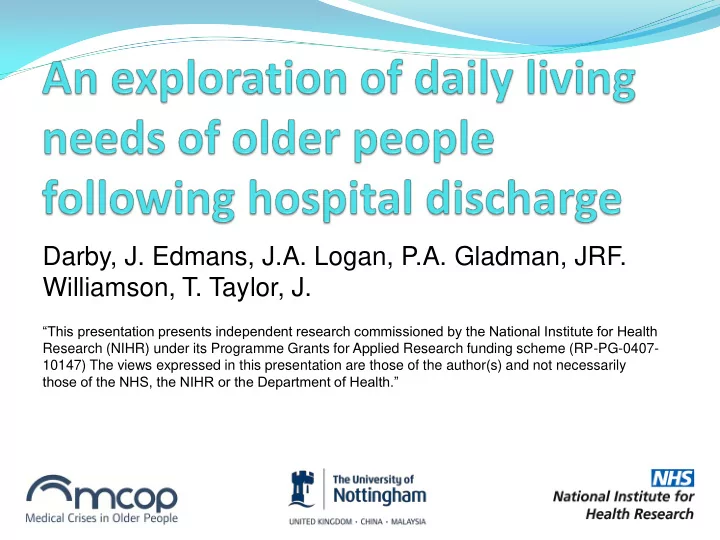

Darby, J. Edmans, J.A. Logan, P.A. Gladman, JRF. Williamson, T. Taylor, J. “This presentation presents independent research commissioned by the National Institute for Health Research (NIHR) under its Programme Grants for Applied Research funding scheme (RP-PG-0407- 10147) The views expressed in this presentation are those of the author(s) and not necessarily those of the NHS, the NIHR or the Department of Health.”
Study Aim To explore older patient and carer perspectives of their everyday activities following discharge from an Acute Medical Unit
Demographic Data (n= 18 patient participants) Gender: Male n= 8 Residency status: Lives alone n= 10 Female n= 10 Lives with partner n= 7 Lives in care home n= 1 Age range: 74-89 years Mean age: 82 years Identification of Seniors at Risk (ISAR) Barthel Score: range 3-20 Score: 2-5 Mean score: 17 Mean score: 3 Admission reasons: collapse/ chest pain/ fall/ swollen leg/ diarrhoea/ S.O.B/ vomiting/ abdo pain/ haematomasis/ back pain/ heart racing Ethnicity: White n= 18
Demographic Data (n= 6 Informal carer participants) No: Barthel Relationship Lives Level of Home care score with support patient 2 19 Daughter No Domestic No tasks 7 12 Wife Yes Personal & Yes domestic tasks 10 17 Wife Yes Personal & No domestic tasks 11 3 Son Yes Domestic Yes tasks 17 18 Daughter No Domestic Yes tasks 18 20 Daughter no Personal & No domestic tasks
Findings Sub-theme 2: Sub-theme 1: Unresolved daily Unresolved health living needs issues Theme: Outstanding needs Sub-theme 3: Impact Sub-theme 4: Value on informal carer of independence
Sub theme 1: Unresolved Health Issues (JD): And what do you think Diane (daughter), do you think there’s been any change at all in the last six weeks? I think that’s Mums probably got less (Diane): energy, so I, my personal view is that I think things are probably a bit worse than they were, at the moment (pg 16).
Sub-theme 2: Unresolved Daily Living Needs Physical Barriers Shortness of breath, exhaustion/ fatigue, reduced mobility, poor balance, pain/ stiffness/ hemiplegia, terrain, requires aid/ adaption Psychological Barriers Loss of confidence Perception of fragility/ageing Embarrassment Fear of falling Social/ Environmental Barriers Need transport to go out No-longer driving Need help from others to go out
Sub-theme 2: Unresolved Daily Living Needs Expressed problems Expressed problems Expressed problems with DADLs with PADLs with Leisure/social ADLs n= 11 n= 8 n= 10 Washing/dressing problems n= 5 Bath/shower transfer difficulties n= 5 Problems with stairs n= 4 Problems with meal preparation n= 3 Difficulty going out n= 8
Sub-theme 2: Unresolved Daily Living Needs (JD): So tell me how you have been getting on since you’ve come home? (Norman): Well, not my normal self, I’ll not keep on about it, not my normal self love, because I can’t seem to get me normal things done, part from carers coming in and helping me extra you know (pg 7).
Sub-theme 3: Impact on Informal Carers I don’t know what to blame it (shortness of (David): breath) on really, but I’m trying anyway, but it’s hard work for my good lady there. It makes it hard work for her, it wears her out a bit, but it is hard work. But she’s struggling. She’s getting by aren’t you? (pg 3).
Sub-theme 3: Impact on Informal Carers (Betty): ... so I say to him (husband) about twenty to seven come on let me get you ready for bed (laughs), so then his ready for bed, so and then I do your (colostomy) bags, do the bags in-between anyway Janet, but it’s a full -time job (pg 2).
Sub-theme 4: Value of Independence (Annie): When I’m out, personally me self how I feel now, which I was before, I feel better doing things, I don’t want to sit about, I says it’s no good sitting about this is your problem, sit about you don’t do nothing, that half your problems, I says “leave me, let me do what I want to do, I’ll not go too far, I know how far I can go now”, I says “I’m pushing myself”, but I says “let me do these things on me own. Like I used to be. And I find out that if I’m doing jobs I feel better in myself (pg 14).
Key Points Missed opportunity for occupational therapy assessment and intervention Role of Interface Occupational Therapist on Acute Medical Units Need to identify an appropriate screening tool
Any questions? janet.darby@nottingham.ac.uk
Recommend
More recommend